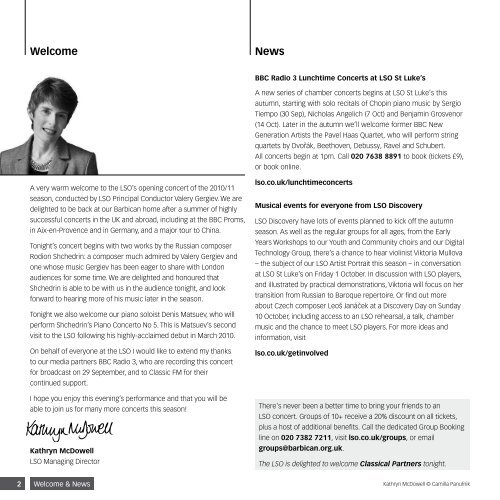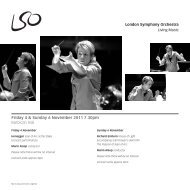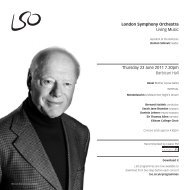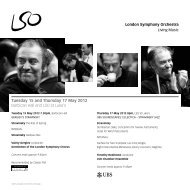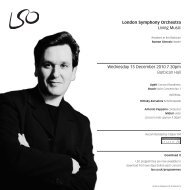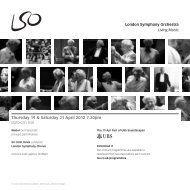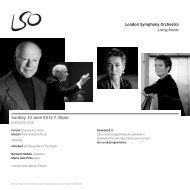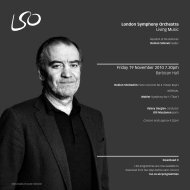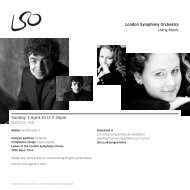25 September programme - London Symphony Orchestra
25 September programme - London Symphony Orchestra
25 September programme - London Symphony Orchestra
You also want an ePaper? Increase the reach of your titles
YUMPU automatically turns print PDFs into web optimized ePapers that Google loves.
Welcome News<br />
A very warm welcome to the LSO’s opening concert of the 2010/11<br />
season, conducted by LSO Principal Conductor Valery Gergiev. We are<br />
delighted to be back at our Barbican home after a summer of highly<br />
successful concerts in the UK and abroad, including at the BBC Proms,<br />
in Aix-en-Provence and in Germany, and a major tour to China.<br />
Tonight’s concert begins with two works by the Russian composer<br />
Rodion Shchedrin: a composer much admired by Valery Gergiev and<br />
one whose music Gergiev has been eager to share with <strong>London</strong><br />
audiences for some time. We are delighted and honoured that<br />
Shchedrin is able to be with us in the audience tonight, and look<br />
forward to hearing more of his music later in the season.<br />
Tonight we also welcome our piano soloist Denis Matsuev, who will<br />
perform Shchedrin’s Piano Concerto No 5. This is Matsuev’s second<br />
visit to the LSO following his highly-acclaimed debut in March 2010.<br />
On behalf of everyone at the LSO I would like to extend my thanks<br />
to our media partners BBC Radio 3, who are recording this concert<br />
for broadcast on 29 <strong>September</strong>, and to Classic FM for their<br />
continued support.<br />
I hope you enjoy this evening’s performance and that you will be<br />
able to join us for many more concerts this season!<br />
Kathryn McDowell<br />
LSO Managing Director<br />
BBC Radio 3 Lunchtime Concerts at LSO St Luke’s<br />
A new series of chamber concerts begins at LSO St Luke’s this<br />
autumn, starting with solo recitals of Chopin piano music by Sergio<br />
Tiempo (30 Sep), Nicholas Angelich (7 Oct) and Benjamin Grosvenor<br />
(14 Oct). Later in the autumn we’ll welcome former BBC New<br />
Generation Artists the Pavel Haas Quartet, who will perform string<br />
quartets by Dvořák, Beethoven, Debussy, Ravel and Schubert.<br />
All concerts begin at 1pm. Call 020 7638 8891 to book (tickets £9),<br />
or book online.<br />
lso.co.uk/lunchtimeconcerts<br />
Musical events for everyone from LSO Discovery<br />
LSO Discovery have lots of events planned to kick off the autumn<br />
season. As well as the regular groups for all ages, from the Early<br />
Years Workshops to our Youth and Community choirs and our Digital<br />
Technology Group, there’s a chance to hear violinist Viktoria Mullova<br />
– the subject of our LSO Artist Portrait this season – in conversation<br />
at LSO St Luke’s on Friday 1 October. In discussion with LSO players,<br />
and illustrated by practical demonstrations, Viktoria will focus on her<br />
transition from Russian to Baroque repertoire. Or find out more<br />
about Czech composer Leoš Janáček at a Discovery Day on Sunday<br />
10 October, including access to an LSO rehearsal, a talk, chamber<br />
music and the chance to meet LSO players. For more ideas and<br />
information, visit<br />
lso.co.uk/getinvolved<br />
There's never been a better time to bring your friends to an<br />
LSO concert. Groups of 10+ receive a 20% discount on all tickets,<br />
plus a host of additional benefits. Call the dedicated Group Booking<br />
line on 020 7382 7211, visit lso.co.uk/groups, or email<br />
groups@barbican.org.uk.<br />
The LSO is delighted to welcome Classical Partners tonight.<br />
Bizet arr Rodion Shchedrin (b 1932)<br />
Carmen Suite (1967)<br />
Introduction<br />
Dance<br />
First Intermezzo<br />
Changing of the Guard<br />
Carmen’s Entrance and Habanera<br />
Scene<br />
Second Intermezzo<br />
Bolero<br />
Torero<br />
Torero and Carmen<br />
Adagio<br />
Fortune-telling<br />
Finale<br />
Ever since Oscar Hammerstein II and Richard Rodney Bennett<br />
collaborated on Carmen Jones in 1943, the idea of adapting Bizet’s<br />
opera to different media has been irresistibly attractive. In the world<br />
of ballet it started in 1949 with Roland Petit for Les Ballets de Paris,<br />
in a production that premiered in <strong>London</strong>. Seemingly unaware of<br />
that version, it had long been the dream of Shchedrin’s wife, the<br />
celebrated prima ballerina Maya Plisetskaya, to dance the title role.<br />
At one stage she even went to Shostakovich with the proposal,<br />
but despite their friendship he refused, on the grounds that it was<br />
impossible to compete with Bizet’s music. A similar response came<br />
from Aram Khachaturian, of Spartacus fame.<br />
Then in 1966 the Cuban National Ballet visited Moscow. Their<br />
passionate style worked on Plisetskaya, so she later said, like a snakebite.<br />
More calculatedly, she realised that a potential collaboration with<br />
virtually the only functioning communist regime in the West might<br />
conceivably gain approval from the Soviet powers-that-be, and she<br />
persuaded the Ministry of Culture to commission a Carmen ballet.<br />
Choreographer Alberto Alonso came up with a politically correct<br />
scenario, in which Carmen would be the victim of ‘a totalitarian<br />
system of universal slavery and submission’, and since time was<br />
short, Shchedrin produced a persiflage of Bizet rather than an<br />
original composition, with all sorts of additional colours and minor<br />
adjustments based on Alonso’s stipulations for drama and pacing.<br />
In the course of 20 days, four of which were spent in Hungary at<br />
the funeral of Zoltán Kodály, the composer ran up a score for strings<br />
and percussion that has since become a favourite in the concert<br />
hall. Plisetskaya herself would go on to dance the role some 350<br />
times, despite having to fight to reverse an official ban after the first<br />
performance (it seems that even as late as 1967 the Bolshoi Theatre<br />
and its political masters had problems with the spectacle of bare<br />
thighs and entwined legs).<br />
In addition to all the favourite tunes from the opera, the 13-movement<br />
Suite borrows two numbers from Bizet’s incidental music to<br />
L’Arlésienne and one from his opera La Jolie Fille de Perth. Shchedrin’s<br />
writing for percussion is the essential ingredient in his translation of<br />
the score, initially to comic-satirical effect, but with ever-increasing<br />
seriousness. If his model was, perhaps, the extraordinary percussion<br />
coda to the second movement of Shostakovich’s Fourth <strong>Symphony</strong><br />
– at that time recently rehabilitated in the Soviet Union – the debt<br />
would be handsomely repaid when Shostakovich composed his 14th<br />
<strong>Symphony</strong> two years later, scored for strings and percussion and with<br />
even a Carmen-ish ‘Malagueña’ as its second movement.<br />
The Introduction to Shchedrin’s Suite steals in as though in a<br />
dream, with tubular bells and col legno strings apparently sensing<br />
impending doom. Then a succession of numbers illustrates the wit<br />
and verve of the scoring, almost as if the composer is imagining a<br />
rebellious orchestra determined to subvert a rehearsal of the opera.<br />
Woodblocks, cowbells and bongos add their wry comments to<br />
‘Changing of the Guard’, insinuating an extra beat before allowing<br />
the music to play ‘straight’. And who could resist the sexy güiro or<br />
the sinuous vibraphone in the famous Habanera, or the sudden<br />
withholding of the theme in the Toreador’s movement?<br />
Already by this stage the hand of Fate has been sensed, and<br />
Bizet’s leitmotiv takes over in the Adagio, the movement whose<br />
choreography had most offended officialdom at the premiere.<br />
Shchedrin plays no tricks with the tragic dénouement, and the Suite<br />
ends as it began, except that, as we know, premonitions have now<br />
been fulfilled.<br />
2 Welcome & News Kathryn McDowell © Camilla Panufnik Programme Notes 3


